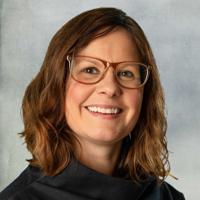Stammering: vocal hindrance or vocal liberator?
Tuesday 11th June 2024, 5:00 PM - 7:00 PM (London Time)
What connects Bachman-Turner Overdrive, Ben’s Brother and The Who? The answer is they’ve all produced songs containing stammered lyrics. Integrating stammering, a communication difference often viewed as something to be fixed through therapy, within musical art may, superficially at least, appear to be an unusual decision but what if we could see beauty in stammering and represent it in art, poetry, song, flags and even font? Come to this workshop to find out how this has been done.
The recent brain research highlighting stammering as a form of neurodivergence is shifting therapy approaches with increasing emphasis on the value of stammered voices. They encourage us to reflect on what matters in conversation and how stammering can add dimension and freedom to vocal performances.
This session will present what stammering is (and isn’t), link the approach-avoidance conflict with performance anxiety and consider what it means to be fluent. The potential physical and emotional struggle contained within the stammering experience is acknowledged alongside opportunities to view stammering through alternative, more supportive lenses, with opportunity to consider what you might do in your practice as a stammering ally.
By the end of this workshop, you’ll understand why King George VI practised speeches with a gramophone playing in the background, where metronomes have been used in therapy and know why speaking with marbles in your mouth is never a good idea!
Carolyn Andrews
Carolyn Andrews is an independent speech and language therapist and senior teaching fellow at the University of Strathclyde. With 25 years’ clinical experience she specialises in adult voice problems and adult stammering, and enjoys walking alongside her clients and students to build their knowledge, practice and voice use.

Attend this course for as little as £22 as part of the Voice Professional Training CPD Award Scheme.
Learn MoreSorry, this is an archived short course...
We have plenty of upcoming short courses coming soon. See details of some of them below or look at the full list of short courses.

Wednesday 4th March 2026
1:00 PM - 2:00 PM
Wednesday 11th March 2026
1:00 PM - 2:00 PM
Wednesday 18th March 2026
1:00 PM - 2:00 PM
Wednesday 25th March 2026
1:00 PM - 2:00 PM
Wednesday 1st April 2026
1:00 PM - 2:00 PM
Wednesday 8th April 2026
1:00 PM - 2:00 PM
(London Time)
Learn to Coach RP and SSBE – a Certificate in Accent Coaching

Louisa Morgan
This six-week course is an opportunity to learn about both Received Pronunciation and Standard Southern British English. Rather than a course in learning how to speak RP/SSBE (there are many brilliant available courses for this already), this course is about learning how to coach it.

Thursday 5th March 2026
1:00 PM - 2:30 PM
Thursday 12th March 2026
1:00 PM - 2:30 PM
(London Time)
Acting Emotion: Perspectives from the Masters

Louisa Morgan
Stanislavski said, “our artistic emotions are, at first, as shy as wild animals and they hide in the depths of our souls.” Michael Chekhov said, our bodies should be like a “sensitive membrane, a kind of receiver and conveyor of the subtlest images, feelings, emotions and will impulses.” And Meisner said we should be “living truthfully under imaginary circumstances.” Join Louisa Morgan in this 2-part course as she explores a range of well-known acting practitioners to investigate what they believed (or believe) about emotion and how they approached it in their work. She'll compare their work to see where they align and where they diverge.


Tuesday 10th March 2026
3:00 PM - 5:00 PM
(London Time)
Living truthfully in the present moment: An introduction to the Meisner Technique!

Abigail Sugden
Sanford Meisner believed that acting is living truthfully under imaginary circumstances. Rooted in behavioural aspects of acting practice, the Meisner Technique is often associated with encouraging actors to live truthfully in the present moment. Aimed at those working within the field of acting, this 2-hour session with Abigail Sugden will focus on the work of Sanford Meisner, introducing the core principles of his technique and discussing the possible benefits to performers.
